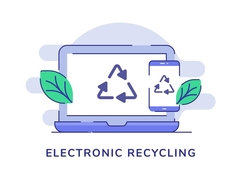"In 2022, an estimated 62 million tonnes of e-waste were produced globally." - World Health Organization
A Comparison of Electronic Recycling Policies Worldwide

Electronic waste (e-waste) is one of the fastest-growing waste streams worldwide, and the management of this hazard is crucial for sustainability. For companies like Midwest Computer Recyclers, understanding global e-waste management policies is essential to ensure effective recycling approaches and environmental stewardship.
Navigating the diverse landscape of electronic recycling policies worldwide offers insights into best practices and solutions applicable to the U.S. and Wisconsin Rapids, WI. In this blog, we'll compare electronic recycling policies across different regions and provide insights for readers to use in their communities.
Join us in exploring how these policies shape the future of sustainable e-waste management and contribute to the circular economy.
The Significance of Global Electronic Recycling Policies
Understanding global electronic recycling policies is essential for several reasons. First, it helps identify successful strategies that can be adapted locally, offering budget-friendly solutions for enhancing current policies. Second, it uncovers challenges and inefficiencies and provides a framework for actionable change.
Global Perspective on E-Waste
According to the United Nations Environment Programme, over 50 million metric tons of e-waste are generated each year around the world, with only 20% being formally recycled. Policies worldwide aim to tackle this mounting challenge through legislation and public initiatives.
Here's a glance at the global landscape:
- Europe : Gleaning insights from the EU's stringent Waste Electrical and Electronic Equipment (WEEE) Directive, which mandates high recycling targets and producer responsibility.
- Asia : Examining Japan's Home Appliance Recycling Law, focused on collaboration with manufacturers for efficient recycling processes.
- North America : Analyzing policies in the U.S. and Canada focusing on voluntary and mandatory state-level programs.
Electronic Recycling Policies in Europe
The EU's Waste Electrical and Electronic Equipment (WEEE) Directive serves as a global leader in managing electronic waste. This legislation obligates producers to finance the collection, recycling, and disposal of electronic goods. With a target of recycling 85% of e-waste by weight, the directive promotes a holistic approach to tackling e-waste.
In Sweden, for instance, successful implementation is evident, with citizens contributing over 16 kg of e-waste per capita for recycling annually. The directive's emphasis on producer responsibility ensures that manufacturers design more recyclable products, reducing waste at the source. This success underscores the importance of legislative clarity and public awareness.
Electronic Recycling Policies in Asia
Japan's Home Appliance Recycling Law is a pioneer in electronic waste management. This law assigns producers the responsibility of recycling specific appliances, creating a cradle-to-grave lifecycle for products. A striking feature of Japan's policy is the emphasis on financial incentives for manufacturers who produce recyclable goods.
Japan's success is also attributed to an infrastructure for collecting and processing recyclable materials. By integrating drop-off points in retail stores, consumers easily contribute to the system. The result? A remarkable 70% collection rate for home appliances, which significantly reduces the strain on landfills.
Electronic Recycling Policies in North America
In North America, e-waste management policies are a mixed landscape of state-level regulations. While the U.S. lacks a federal mandate, states like California lead with comprehensive policies that enforce bans on landfill disposal of certain electronics.
Similarly, Canada employs Extended Producer Responsibility (EPR) programs across its provinces, which emphasize manufacturers' roles in end-of-life product management.
Overcoming Challenges in E-Waste Management
Despite various global strategies, challenges persist in e-waste management:
- Compliance and Enforcement : Regulatory enforcement remains a significant hurdle. Strengthening alliances between authorities and the private sector can improve compliance and monitoring.
- Consumer Awareness : Educating the public about the benefits of recycling is crucial for increasing participation. Initiatives akin to Sweden's national campaigns can enhance awareness.
- Financial Viability : Implementing policies often involves significant investment. Exploring budget-friendly alternatives, such as shared facilities or government subsidies, can ease financial pressures.
Conclusion
The responsibility lies with each of us to contribute to e-waste management through informed practices and community involvement. Work with Midwest Computer Recyclers to learn more about how we can help you make a difference in electronic waste reduction.
Contact us today to explore custom solutions tailored to your needs or discover our services to join the global movement toward sustainable electronic recycling.